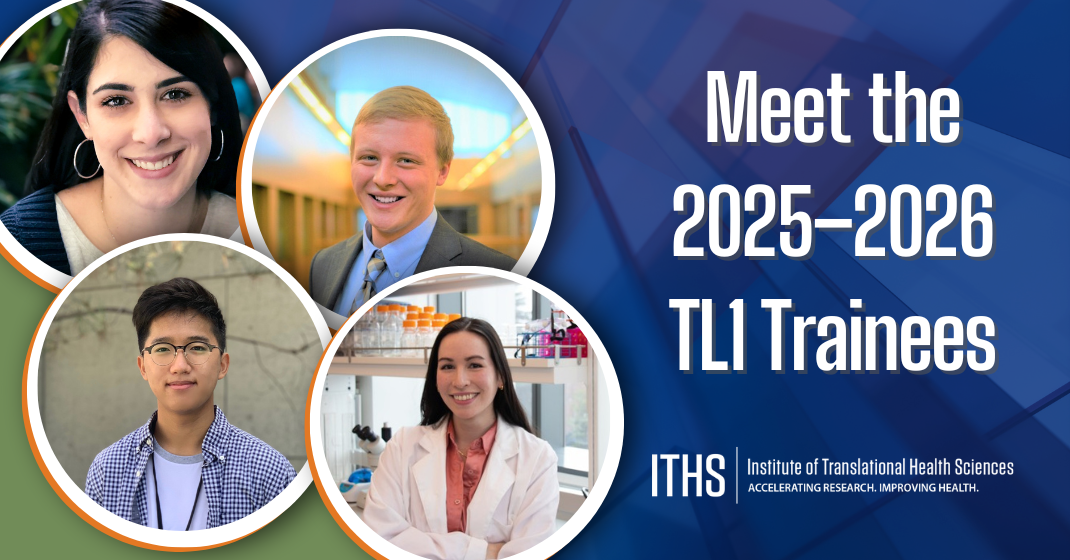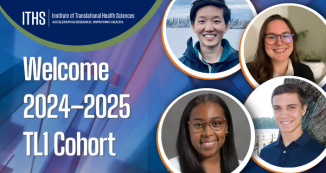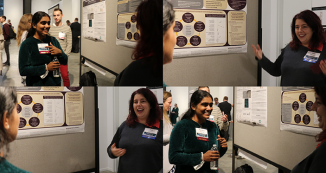
24 Apr ITHS Announces 2017 Cohort of TL1 Pre-Doctoral Trainees
Training in translational research provides a unique opportunity for students to participate in a cross-disciplinary community while learning core research methodologies. In order to provide this opportunity at the University of Washington, the Institute of Translational Health Sciences offers the mentored year-long TL1 Translational Research Training Program, which includes experiential learning, network opportunities, project funding, stipend, and tuition support.
The ITHS is proud to announce the 2017 cohort of awardees. This year, 20 students were selected from across all six health science schools and the College of Engineering. Through a mix of didactic and experiential learning, trainees will broaden their knowledge of translational research methods, participate in immersive experiences within other disciplines, and complete collaborative projects. According to the TL1 Co-Director Joie Whitney, “the upcoming program is expanding content and interactive sessions that will help trainees to understand and gain skills required for successful interprofessional/team science collaborations.”
| Name | UW School | Research Project |
|---|---|---|
| Martha Aby | Social Work | Cultural and Ethnic Minority Infrastructure Program Evaluation |
| Juandalyn Burke | Medicine | Using Pharmacogenomic Data to Predict Levels of Drug Resistance in Heterosexual Populations in sub-Saharan Africa |
| Laura Chambers | Public Health | Patterns and Predictors of Sexual Risk Behavior Among Men Who Have Sex With Men |
| Ana Chang | Dentistry | Understanding Oral Health: Contribution of Commensal Oral Bacteria into the Regulation and Maintenance of Oral Health |
| Chad Curtis | Engineering | Quantitative, high throughput method for characterization of therapeutic nanoparticle behavior in a physiologically relevant model of the brain |
| Makayla Cordoza | Nursing | Clinical Impact of Shivering and Energy Expenditure in Adults Undergoing Targeted Temperature Management After Cardiac Arrest |
| Lyrialle Han | Pharmacy | Investigating the placental-fetal disposition of bupropion during pregnancy using in vitro models and physiologically-based pharmacokinetic models |
| Erin Harrop | Social Work | Examining patient conceptualizations of eating disorder and remission processes: A mixed-methods study of women’s experiences with Atypical Anorexia |
| Tiffany Jones | Social Work | Enhancing Data Driven Decision Making for School Improvement at Seattle Public Schools |
| Jake Kraft | Pharmacy | Nanoparticle Design Principles for Subcutaneous Long-Acting Drug Combination Formulations |
| Arianna Miles-Jay | Public Health | Genomic epidemiology of trimethoprim-sulfamethoxazole resistance among Escherichia coli ST131-H30 isolates from US children |
| Nisa Penland | Engineering | Engineering 3D Human Cardiac Tissues with Helical Architecture for Modeling Dystrophic Cardiomyopathies |
| Angela Primbas | Medicine | Cost-Effectiveness Analysis of HIV Treatment as Prevention Programs in Lima, Peru |
| Maria Pyra | Public Health | HIV Pre-Exposure Prophylaxis During Pregnancy: The Effect on Drug Concentrations |
| Jamaica Robinson | Public Health | Neighborhood attributes and synchronous patterns of distant metastases from colorectal cancer |
| Charles Roco | Medicine | Personalized Cancer Predictions Through Scalable Single Cell RNA Sequencing |
| Mikel Ruterbusch | Medicine | Der p 2-specific B cells in house dust mite-induced asthma |
| Emily Scott | Medicine | Differential Immune Response to Infection in Infants and Adults Acutely Infected with RSV |
| Faith Stevison | Pharmacy | Translation of observed in vitro CYP2D6 downregulation by 13-cis retinoic acid to clinical drug-drug interactions |
| Kerri Thomas | Medicine | Interleukin-7 receptor signaling in Philadelphia chromosome-like acute lymphoblastic leukemia |







